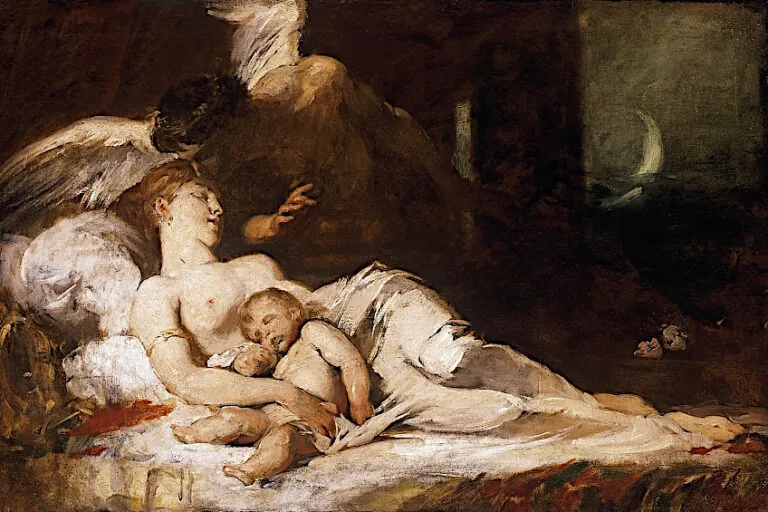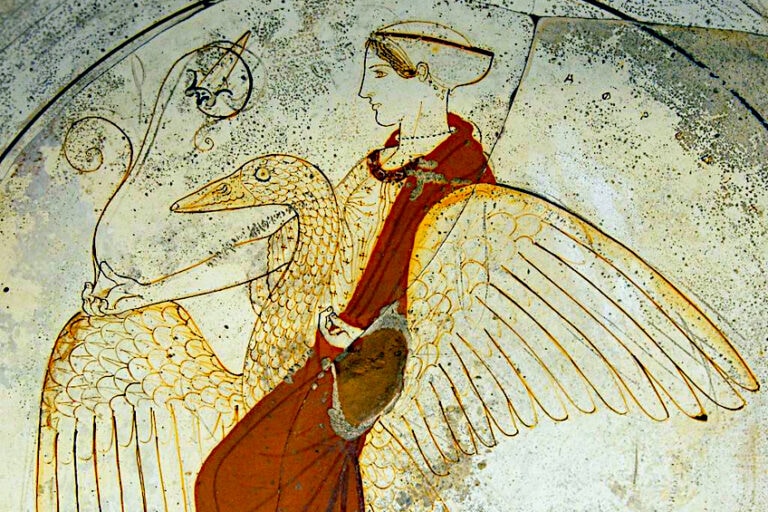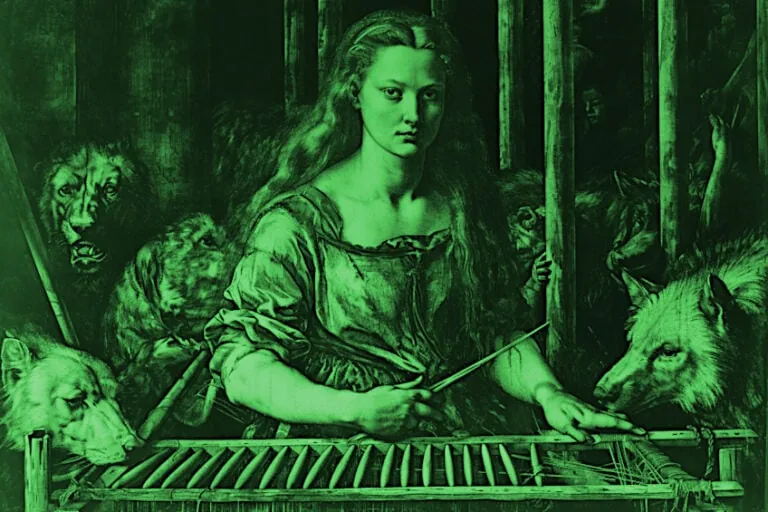Greek Goddess Themis – Guarantor of Universal Order
In a world born of chaos, the Greek goddess Themis stands firm and true as the embodiment of natural law, order, and justice. The Titaness is credited as one of the backbones of ancient Greek society in both the heavens and on earth, and creating the framework that allows their peaceful interaction. Join us in exploring the origins of the wise and impartial Lady Justice who continues to shape society to this very day.
Contents
The Role of Themis: Goddess of Divine Law and Justice
| Name | Themis |
| Gender | Female |
| God of | Divine law, customs, and justice |
| Personality | Sober, wise, and impartial |
| Symbols | Scales of justice and a sword |
| Consorts | Zeus |
| Children | The Horae and the Moirai |
| Parents | Uranus and Gaia |
The Greek goddess Themis was a Titan considered to be the embodiment of divine law, order, customs, and justice. The ancient Greeks put much stock into proper procedures, rituals, ordinances, and social norms and customs, as without them society and the natural world would descend into chaos.
Themis was the organizer and overseer of these natural laws and divine edicts, as well as that of the oracles through which she spoke them to mankind.
Revered and respected as a wise advisor and organizational authority by man and gods alike, she ensured the sanctity and fairness of the proceedings of social affairs, worship, and judicial matters.
 Themis as organizer and overseer of natural laws; artist’s impression
Themis as organizer and overseer of natural laws; artist’s impression
Background and Family of the Goddess of Law and Order
Themis’ name comes from the Greek verb ‘títhēmi’ meaning “to put”, however, it translates to “that which is put in place”, and means “divine law”. Themis was at first a simple organizer of humanly communal matters such as assemblies, and was used to refer to correct forms of customs, procedures, order in social affairs, and simply divine will, which sometimes were one in the same.
The word ‘themis’ was also used to describe things being done or not done in certain ways, such as cultural norms, however, laws created by communities and people were called ‘nomoi’.
Originally a simple concept of rightful proceedings in civilized communal life, she became an embodiment of aspects of justice, fairness, and a force of order in the world as a whole.
Family of the Titaness Themis
In common tradition, the Greek goddess Themis’ parents were Gaia, the earth mother, and Uranus, the sky father. She was one of their twelve original Titan children stated in Hesiod’s Theogony (8th-7th century BCE). She is thus sibling to groups such as the Hecatoncheires, the Gigantes, and the Cyclops, and half-sibling to beings like Aphrodite, Python, and Typhon. Alternatively, Themis’ parents were also later suggested to be Gaia and Aether, a god of light and the bright blue air or ether in the heavens that separated the sky dome and the air bound to earth.
In Hesiod’s Theogony the Titaness was the second wife of Zeus and bore him daughters known collectively as the Horai or Seasons.
The Horai are the goddesses of the seasons and time, and usually count three in number but their makeup changes with variation in myths. The commonly held lineup for the Horai is usually split between the Greek goddess of justice trio of Eunomia, Eirene, and Dike and the more nature-coded trio of Thallo, Auxo, and Carpo. Later traditions also suggest that rather than Nyx, it is Themis and Zeus who were the parents of the Moirai, Lachesis, Clotho, and Atropos, who are also known as the Fates.
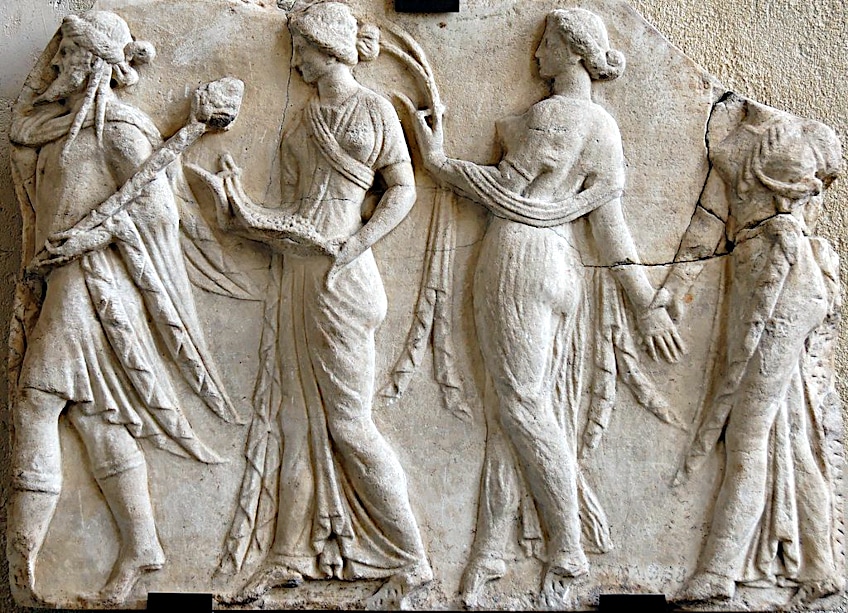 Fragment of a Roman relief copied from Greek original depicting a bearded Dionysus leading the Horai (1st Cenury CE); Louvre Museum, Public domain, via Wikimedia Commons
Fragment of a Roman relief copied from Greek original depicting a bearded Dionysus leading the Horai (1st Cenury CE); Louvre Museum, Public domain, via Wikimedia Commons
Themis’ Significance in Greek Myth
The world of the Greeks was a chaotic one, with fickle gods and evils that stalked mankind. As the gods were believed to have had a very real influence on everyday life, offending them or breaking the balance of the world had truly catastrophic and chaotic effects and made the world a very scary place to be a powerless mortal.
Themis represented divine law, the natural and unwritten rules decided upon by the gods, and it was she who conveyed them to mankind through oracles.
She was the one who gave mankind the customs and correct rites of honoring the gods and facilitated orderly and peaceful relations between them. In this way, she carved civilization from chaos and maintained order among the heavens and the earth. Themis does so by presiding over the correct ways of communal gatherings, assemblies, rituals, and even the orderly existence of gender norms, family, and political structures and customs that make up society. An example of her importance is seen when she is credited as the source of rules concerning things such as honors and rules around sacrifices and ordinances, which played a large role in ancient Greek cults and everyday life as a whole. Obedience of laws was directly associated with cosmic peace and thus those who upheld these laws and “preserved what is holy” were known as ‘thesmophulakes’ (law-guardians) and ‘thesmothetai‘ (law-givers).
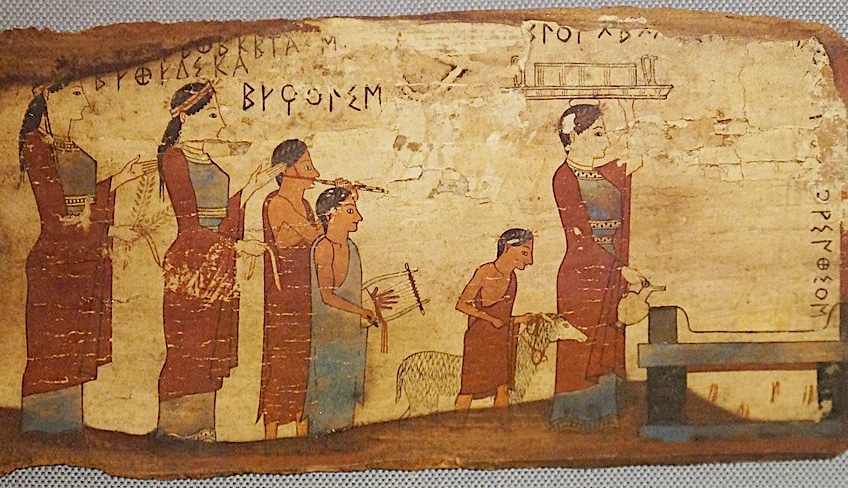 Depiction of a ritual sacrifice enacted in accordance with strict rules and guidelines (Pitsa panel NAMA 16464) (6th Century BCE); Schuppi, CC BY-SA 4.0, via Wikimedia Commons
Depiction of a ritual sacrifice enacted in accordance with strict rules and guidelines (Pitsa panel NAMA 16464) (6th Century BCE); Schuppi, CC BY-SA 4.0, via Wikimedia Commons
With the addition of her embodying justice, in Hesiod’s Theogony, alongside law and order, she ensures the hope of fairness and satisfaction among the poor and the wronged of society. In this way she becomes a true goddess of the people and backbone of the Greek reality, preventing a disastrous slide into chaos and tragedy. Beliefs have her sat enthroned on Olympus as the “lady of good counsel”, ever watchful for those who broke the laws among gods and men and reported sinners diligently to Zeus alongside her daughter Dike.
Themis was not only a wise counselor for her penchant for order and impartiality. The Titan goddess was an ancient oracular figure, inheriting the title of overseer of oracles and the Oracle at Delphi from her mother Gaia, with some claims she was the one who founded it.
In mythology, Themis was often seen with some warning of danger or advice on a course of action. In mythology, she advises many throughout the ages, warning the Titans of Zeus winning through guile or cautioning Zeus and Poseidon away from Thetis as her son would be more powerful than his father. Themis and the god of foresight Prometheus are credited for some of the same warnings, and in Prometheus Bound (5th century BCE) she is considered his mother. She was also credited with the oracle advising Deucalion in repopulating the earth after Zeus’ deluge ended the Bronze Age.
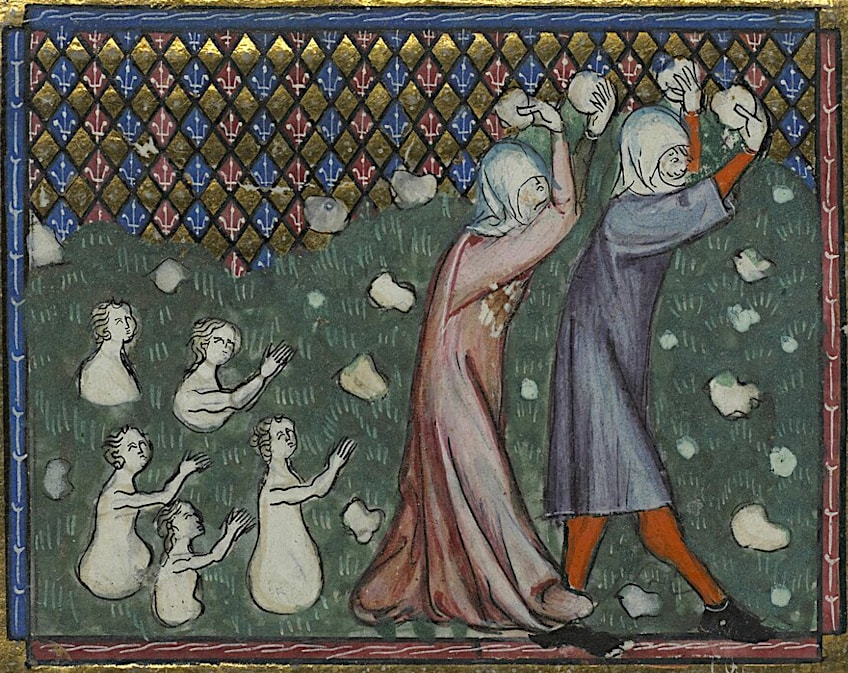 Illuminated manuscript illustration of Deucalion and Pyrrha recreating the human race from cast stones as instructed by Themis (1325); Bibliothèque nationale de France, Public domain, via Wikimedia Commons
Illuminated manuscript illustration of Deucalion and Pyrrha recreating the human race from cast stones as instructed by Themis (1325); Bibliothèque nationale de France, Public domain, via Wikimedia Commons
Some also attribute her to having a hand in plotting the Trojan War that ended the Age of Heroes, as Gaia was struggling beneath the weight of too many superhuman heroes. Themis is an ancient Titan goddess who was believed to have shaped existence from her very inception and was held in esteem high enough to reflect it.
The Attributes and Personality of Themis
Themis is a respected symbol of stability and sobriety in Greek mythology. She is held in high esteem amongst both gods and men, with the Olympian gods referring to her as “Lady Themis” and her being the one to call them to assembly. Her epithets include “Soteria” or “Saviour”, and she is also called “the lady of good counsel”. She is known by descriptors such as pure, holy, venerable, wise, and well-counseled. She is described as an ever-watchful and unswerving goddess, with her diligence and unwavering devotion to order and justice being highly acclaimed.
Themis is also beautiful, majestic, and “divinely bright”, as many goddesses and consorts of Zeus are, and is notably treated without anything but respect by her fellow gods.
She is demonstrated as friendly with the usually ever-jealous Hera, in amiable and close partnership with Zeus, and explicitly free of the wrath demonstrated by Nemesis. Themis is an agent of peace and order, in both her role and her impartiality. Justice and social order are a swift and decisive wheelhouse, and she displays her authority quite fearlessly. Keeping the tumultuous Greek gods in order at assemblies and feasts is not for the fair of heart and in myth, she is able to swiftly cease their fighting with a mere warning when they squabble over the Trojan Horse and incite Zeus’ anger.
 Themis as cosmic referee; artist’s impression
Themis as cosmic referee; artist’s impression
What did Themis think about herself, we may never know, as our lack of descriptors of her personality gives us little clue, however, we do know what everyone else thought of her. From the honor she is shown by the realms of both gods and men, she is a goddess of dignity, dedication, and fairness, as befits her role as both a Greek goddess of justice and a goddess of law.
Appearance and Symbols Associated With Themis
Themis was considered a beautiful goddess of sober disposition fitting her serious and impartial role. One of her main symbols is that of the tripod, a three-legged stool used in offerings and other ritual proceedings, and famously the seat of the oracle Pythia. The tripod is thus associated with her role in introducing religious ordinances and prophecy to mankind. The most recognizable of Themis’ symbols is that of the balancing scales, held in one hand and representing her weighing the deeds of men and seeking the balance that would create justice.
 Modern statue of Themis on the dome of the McLennan County Courthouse (2018 replica of the damaged 1902 original); Leo1701, CC BY-SA 4.0, via Wikimedia Commons
Modern statue of Themis on the dome of the McLennan County Courthouse (2018 replica of the damaged 1902 original); Leo1701, CC BY-SA 4.0, via Wikimedia Commons
She later acquired a sword, used as a symbol of her power and authority and the swift and keen string of her justice. Some additional suggested symbolism includes referencing her ability to split that which is fact from falsehood and see to the heart of an issue swiftly.
Over time Themis and her daughter Dike were increasingly conflated with Iustitia, the Roman personification of justice.
In the 16th century the figure of ‘Lady Justice’ gained a blindfold over her eyes, reportedly this was originally satirical to reference Lady Justice being blind to the injustices before her but was later co-opted into her image under references to her impartiality and fairness of all under the eyes of the law.
Themis’ Worship
The cult of Themis was widespread, and she had many shrines and altars across the ancient Greek world. She was often honored in places of other deities, such as her shared sanctuary with Aphrodite in Asclepius at Epidauros, her altar near the altar of Gaia at Olympia, and her temple near the oracular shrine of Zeus at Dodona. Themis had temples at the Acropolis in Athens, and at Tanagra and Thebes in the Boiotia region, and a possible oracular shrine at Boukheta.
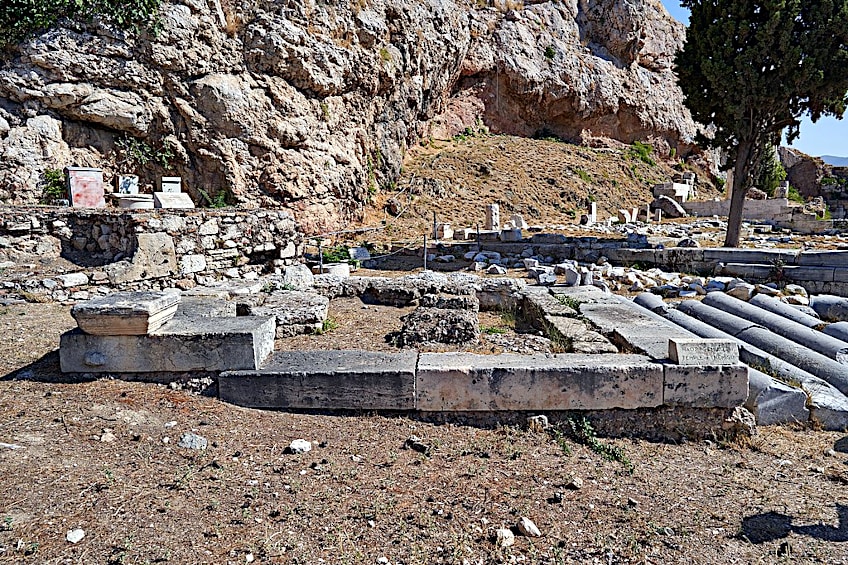 Remains of the temple of Themis on the southern slope of the Acropolis in Athens; George E. Koronaios, CC BY-SA 4.0, via Wikimedia Commons
Remains of the temple of Themis on the southern slope of the Acropolis in Athens; George E. Koronaios, CC BY-SA 4.0, via Wikimedia Commons
Themis was worshiped in the town of Ikhnaia in Phthiotis, Thessalia as Themis Ikhnaia, which associates her with the “tracing” goddess Ichnaea. She was also honored as the prophetess at the Oracle at Delphi, having inherited the oracular seat from her mother Gaia before giving it to her sister Pheobe and then later to Apollo. She is often given honors in divine rites and ordinances as well as literature on prophecy and the Oracle of Delphi, as it was she who first introduced those notions to mankind and thus should have her role acknowledged.
It is reasonable that she is invoked in settings that relate to these roles of hers and her spheres of overseer of social order, divine law, and justice.
She also has some associations with Demeter Thesmophoros (“Bringer of Law”), and Demeter’s daughter Persephone who is the goddess of spring and Queen of the Underworld, while Themis’ daughters are goddesses of the seasons and time.
Literature Involving the Greek Goddess Themis
Outside of being invoked in hymns, Themis is often mentioned in writings as a source of advice, whether it be warning of danger or helping find answers to complex problems. Several myths show just how influential this Titan was thought to be in the Greek understanding of the world. According to Aeschylus in Prometheus Bound, Themis was the mother of Prometheus and shared with him the secrets of the future.
She warned him that the Olympians would overthrow the Titans by guile rather than strength, and that he would ultimately be freed from the punishment given to him by Zeus by a man.
Themis also warned Zeus and Poseidon away from Thetis as she was fated to bear a son mightier than his father, a worrisome concept for both gods. Thetis eventually married a mortal man Peleus and their son was the great hero Achilles. Their wedding also saw the origins of the Trojan War, when Eris (Strife) took revenge for not receiving an invitation by sparking the contest between Hera, Aphrodite, and Athena that was resolved by the Judgement of Paris.
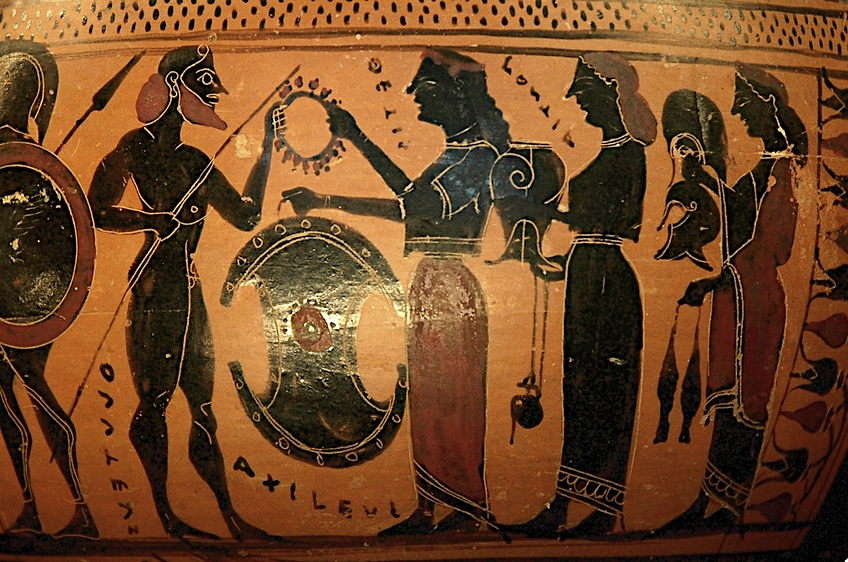 Attic black-figure hydria with a depiction of Thetis giving Achilles the weapons made for him by Hephaestus (575-550 BCE); Near the Tyrrhenian Group, CC0, via Wikimedia Commons
Attic black-figure hydria with a depiction of Thetis giving Achilles the weapons made for him by Hephaestus (575-550 BCE); Near the Tyrrhenian Group, CC0, via Wikimedia Commons
It was Themis who prophesied to Atlas that a son of Zeus would steal from the garden of the Hesperides, and Themis’ prophecies that prevented the goddess Hebe from forswearing giving another man the gift of restored youth. Like with the Titanomachy, Themis also foresaw the defeat of the Giants at the hands of the Olympian gods.
Themis was said to have been present at Apollo’s birth and the one who nursed him on nectar and ambrosia, he also later took control of her oracular seat by slaying the monster Python who guarded Delphi.
Themis is also connected to the fate of mankind in two big ways in mythology. The first holds that Themis was the one who advised Deucalion through an oracle on how to repopulate the earth after Zeus’ deluge flooded the earth. The city of Bucheta in Epeiros was said to have gotten its name when Themis rode there on an ox during this great flood, and it’s presumed she had some sort of oracular shrine in the city. The second way is that in the Greek epic Cypria (7th or 6th-century BCE), Themis helped Zeus to plot the beginning of the Trojan War as a means to deal with the overpopulation of the world with heroes. The philosopher Plato (4th century BCE) noted that it was Themis who urged Eris to create discord at the wedding of Thetis and Peleus.
The Legacy of Themis, Goddess of Law
The legacy of Themis lives in ideas and institutions of order around the world today. Themis laid down the sanctity of social assemblies and the importance of proper procedures, as well as ideas about morality and customs pondered upon for centuries.
Her symbolism has informed much of how the North-western regions of the world view ceremony, morality, and justice.
Themis shows us that it is we who make up a society, and our collective actions that shape what world we live in. If we all do what is right and hold our fellows accountable, we live in a world of peace and order. However, this also comes with a warning, that if we stray too far and become too comfortable with evil and disrespect for our world, whether that be our great civilizations or our environment, will fall into chaos and tragedy. Themis also represents the hopeful ideal that our world will be fair, and that if we are to be judged, it will be impartial and that justice will prevail.
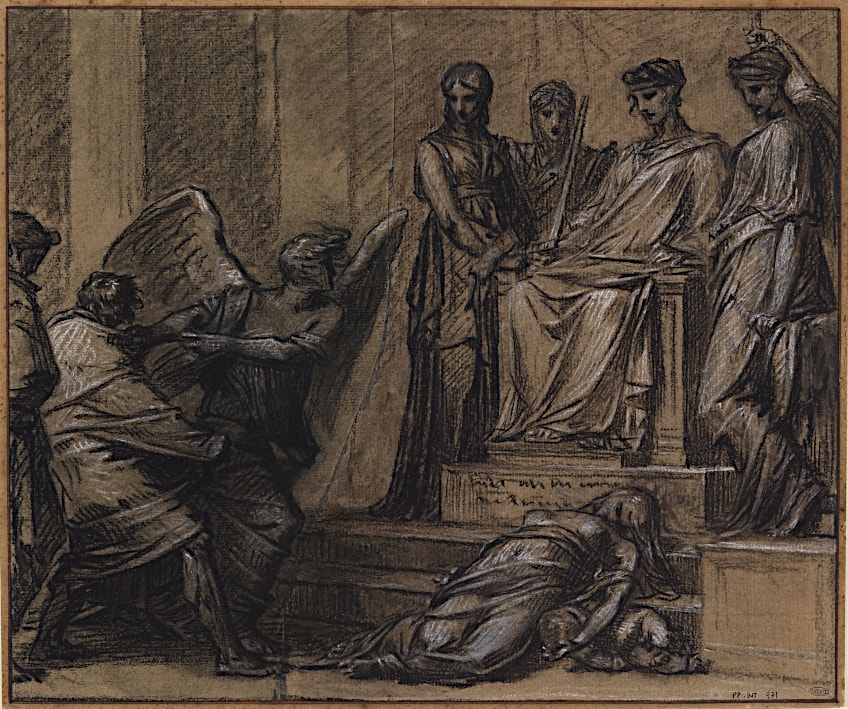 Themis and Nemesis (sketch for Divine Justice Prosecuting Crime) by Pierre-Paul Prud’hon (1805); Prud’hon, Pierre-Paul (Cluny, 04–04–1758 – Paris, 16–02–1823), draughtsman, CC0, via Wikimedia Commons
Themis and Nemesis (sketch for Divine Justice Prosecuting Crime) by Pierre-Paul Prud’hon (1805); Prud’hon, Pierre-Paul (Cluny, 04–04–1758 – Paris, 16–02–1823), draughtsman, CC0, via Wikimedia Commons
Order and justice have always, and always will be, needed in our world but Themis also shows that they must be grounded in logic and future consequences must be taken into account. As Themis looked to the future when weighing her options and giving advice, so our actions require careful consideration of the long-term effects they could bring. Like much of policy creation and personal planning, the best outcomes consider what is right for the here and now and the future to come.
The Goddess of Justice’s Modern Influence
The Greco-Roman concepts of law, justice, fairness, sacred processes of assemblies, and benevolent precedent that Themis embodied and upheld are alive and well in the world, though usually around places of ancient Greek, Roman, and more modern Western influence. Her image has been taken as that of “Lady Justice” and supposedly represents the moral forces of the judicial systems of the world. As such Themis’s influence is most clearly seen in courts where this image is a popular option for art and architecture. Her symbolism of the hard and impartial fairness of the law across all identities and the importance of law and order to the functioning of society is alive and well. Everyone has their day in court, and Lady Justice remains ever watchful of proceedings before her.
Themis is a titan of Greek mythology who was the goddess of law and order in the realms of gods and men. She was a wise counselor and oracular figure, giving advice to many and helping maintain the stability of the world. Themis has always been the embodiment of fairness and justice, even in the more modern image of the blind Lady Justice, and her influence has permeated throughout Western cultures and the world at large. A paragon of sober impartiality, and yet care-filled balance, the Greek goddess Themis fights against the chaos of the world and remains a stalwart symbol of hope and rightness.
Frequently Asked Questions
What Is Themis the God Of?
Themis is the Titan goddess of divine order and natural law. She is the embodiment of justice and held the title of the first holder of the Oracle at Delphi. She is believed to be the origin of divine laws and customs of man, and the one who presides over the assemblies of both gods and men.
What Is the Role of Themis in Greek Myth?
Themis is a force of order among the gods, and is responsible for their rules and assemblies. She gives to humanity the rules and customs they live by in the world. She is most often mentioned in myth and writings as a wise advisor with the gift of prophecy, warning of dangers, and providing answers to gods and men throughout the ages.
What Are Considered Themis’ Symbols?
Themis is the embodiment of fairness and justice, and judges were referred to as her servants. Her main symbol was that of the tripod, alluding to her role in sacrifices, rituals, and prophecy, but is now more readily identified as that of the scale. The scale represents how she weighs the words and acts of men against their consequences and balances them before justice. She later gained a sword, symbolizing her authority and the swiftness and sharpness of her justice, cutting through falsehoods decisively. Modern representations of her predecessor Lady Justice as blind and impartial only came about in the 16th century CE.

I am deeply passionate about history and am constantly fascinated by the rich and complex stories of the past. As the editor-in-chief of learning-history.com, I have the opportunity to share this passion with a wide audience through the creation and distribution of engaging and informative content about historical events, persons, and cultures. Whether it’s through writing articles and blog posts or creating videos or podcasts, I strive to bring the past to life in a way that is both accurate and enjoyable. My expertise in history, combined with my strong writing and communication skills, allows me to effectively communicate complex historical concepts and make them accessible and interesting to a wide range of readers. I am truly grateful for the opportunity to share my love of history with others through my work on learning-history.com.




